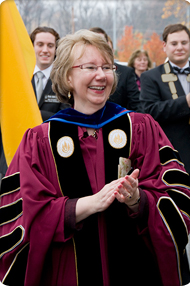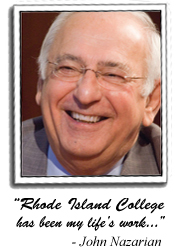The RIC/AFT Assembly of Departmental Representatives write to express our concern over, and objection to, the use of Rhode Island College Foundation funds to hire the State of Rhode Island’s Chief Innovation Officer (CInO). While the Foundation is an independent entity over which faculty members have no direct control, we feel compelled to speak out on this matter in an effort to protect the interests and integrity of the College.
The Providence Journal (1/18/16) reported that RIC’s associate vice president for development and external relations, Edwin Pacheco, indicated that “excitement, not concern, has been the overwhelming campus reaction to the creation of the innovation office.” The basis for such a statement is unclear to us. The faculty was not consulted on this appointment, and it was presented to neither the Council of Rhode Island College nor the RIC-AFT. Most faculty members learned about it after the fact from the newspaper.
Our first concern is the inconsistency of the appointment with the stated mission of the RIC Foundation. The Foundation’s Vision Statement asserts that its “mission is to offer accessible higher education of the finest quality to traditional and non-traditional students from around the state, the region, and beyond.” The Mission Statement asserts that the Foundation is “devoted to raising funds solely for Rhode Island College” (emphasis added). While the presence of the CInO on campus might benefit RIC in some ways, the funds expended for this position can in no way be said to be “solely for Rhode Island College.”
Second, the appointment diverts resources that could have been used to advance the College directly. The CInO’s reported $210,000 salary plus benefits could have been used to hire at least four full-time, tenure-track faculty members. For many years, the FTE cap at RIC has been frozen; the College therefore is forced to rely heavily on contingent employees (adjunct faculty). While the adjuncts are typically excellent instructors, they often teach heavy loads at multiple institutions, do not have formal advising and mentoring roles, and do not participate fully in college governance. They are also poorly paid and do not receive benefits. If the Foundation wants to strengthen
teaching and mentoring at the College, supporting new full-time faculty lines would be far more useful and provide more direct benefits.
Alternatively, this money could have been used to provide scholarships for low-income students. Many RIC students struggle to make ends meet and are forced to work full-time, which makes it difficult for them to carry a full academic load. Such students take longer to complete degrees and they drop out more often. The money used to pay the CInO would have provided full-tuition scholarship for least two-dozen Rhode Island students.
Third, the appointment has unnecessarily placed Rhode Island College in the center of unwanted political controversy. Common Cause Rhode Island has pointed out the serious issues of government transparency that are raised by this appointment. State senators and
representatives have stated their opposition to appointing a member of the governor’s cabinet in this way, and legislation is being prepared to prevent such appointments in the future. The faculty understands well that the college depends on the good will of both the legislature and the governor for our funding. The Foundation Board showed poor judgment by placing the college in the center a conflict between government leaders.
Finally, the use of Foundation funds for purposes other than supporting the College has the potential to harm the College by reducing future contributions to the Foundation. Contributors to the Foundation, a group that includes many faculty members, have a right to see their contributions used in ways consistent with the Foundation’s mission. The misuse of these funds, and the very public controversy over the issue, is likely to dissuade parents, alumni, and faculty members from making contributions in the future. We have seen evidence that this is already occurring.
In sum, we do not believe that the appointment of the RI Chief Innovation Officer through the RIC Foundation is in the best interests of the students or the faculty of Rhode Island College.





